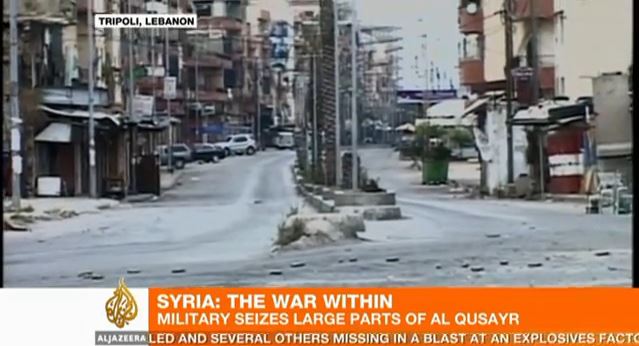 A deserted street in Tripoli during fighting between Alawites and Sunnites. (Al-Jazeera)
A deserted street in Tripoli during fighting between Alawites and Sunnites. (Al-Jazeera)
Estimation and outlook on the situation in Syria and the region – Part 2
Not happy with Hezbollah
People in Lebanon – many Shiites among them – are not content and even angry about Hezbollah´s role in Syria. But they can’t or don’t want to get rid of the organization for several reasons.
Many Shiites depend on Hezbollah, and the others just have no serious means to confront the organisation or are bound in political affiliations. Though, the latter may be in flux as some recent moves of Christian leader Michel Aoun suggest, who signed a Memorandung of Understanding with Hezbollah.
Druze leader Walid Jumblatt as well does not seem to be so certain anymore about the outcome in Syria. He might switch his stance again, as he has done after the May 2008 events in Beirut.
Consequently, Aoun and Jumblatt could do their shifts in opposite directions: Aoun away from Hezbollah and Jumblatt towards Hezbollah.
If Assad wins Hezbollah will get stronger
Lebanese can live with a stable Syria under President Bashar al-Assad, which does not export its full-blown war to Lebanon. Many Lebanese had traditional and flourishing business ties with Syria that now are broken, let alone cross-border family relations.
With a likely strong shift of the power balance in the Syrian war towards the goverment, politicians and political parties in Lebanon are going to readjust their agendas.
If the Assad government can indeed succeed on the long run, it will also tighten its grip on Lebanon again. Hezbollah´s influence will grow, maybe even bigger. Assad it indebted to the Shiite party and its backer Iran and will facilitate that.
The international community does not act in Syria since two years. One can say with almost certainty, it won´t hinder Syria when the bigger neighbour reaches out to Lebanon again.
Situation in Lebanon to remain stable
We think the situation in Lebanon is going to remain stable. The ordinary clashes – albeit more intense – will take place occasionally, especially in and around Tripoli and to the north; maybe in Saida and in Muslim-dominated parts of Beirut.
Nevertheless, we don’t think the country is on the edge of a large inner confrontation. The Christians have no appetite for more than ferocious words, Hezbollah is busy in Syria, and the Sunnis are no united military force to reckon with.
As one consequence of the Lebanese Civil War from 1975-90 the country´s territory is in big parts split along religious lines. This very fact could safe Lebanon this time from another devastating round of war.
Muslims may fight, Christians not
We think the Christians won´t take part in potential future fighting, but just protect their regions in case that is needed.
Although Michel Aoun and Samir Geagea are still not friends, and the old and well known rhetoric comes up regularly – especially in the run-up to elections – we don’t think they will again pit their followers against one another, the majority of whom having no appetite for that.
Consequently, a conflict – if it should arise – would play out between Shiites, Sunnites, Druze and Alawites, the Muslim sects of Lebanon and within their territories.
The Army
The Lebanese Army (LAF) has become the stabilizing element. Since several years, army and security apparatus are able to contain or close off conflict areas and effectively shield the rest of the country from zones of fighting, keeping violence local and not letting it spread like wildfire.
Hopes are, Jihadists won´t carry out indiscriminate car bombings, which could send Shiite and Sunnite communities on one another’s throat.
Strategical situation along the Syrian coast
Given the overall regional situation, in which nobody wants to ignite the fuse of a havocking war that grips the whole region, chances seem dim now for the Syrian opposition to oust Syrian President Bashar al-Assad.
Once the area running along Lebanon´s northern border is under regime control and the largely Alawite dominated coastal strip as well, the Syrian army is in the perfect driver´s seat to cut off supplies for the opposition being smuggled from Lebanon, open its own supply routes from Mediterranean ports and sweep one opposition stronghold after the other.
This may take time. But with more and more regions under its control, the regime is in no hurry.
This is an estimation of possible future developments that we anticipate. Tomorrow we will talk about a potential tacit agreement on Syria and Turkey´s role in the conflict.
